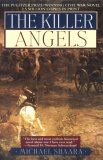Jacqui Murray's Blog, page 149
June 24, 2014
100-Word Challenge–The Contest
 I got tagged by Tess over at How the Cookie Crumbles. She’s a regular participant in Julia’s One-Hundred Word Challenge for Adults. I’m not. I could never keep to the schedule, but Tess’s submittals are amazing.
I got tagged by Tess over at How the Cookie Crumbles. She’s a regular participant in Julia’s One-Hundred Word Challenge for Adults. I’m not. I could never keep to the schedule, but Tess’s submittals are amazing.
So one week, I commented on her pithy submission. The next week, Tess formed her weekly challenge around my comment–and the race was on. I had to respond. Right? As my efriend Peter says over at Counting Ducks:
Yellow is the heart of green.
Understand? (You thought I wasn’t paying attention, didn’t you, Peter?)
Here’s my response to Tess (you’ll have to read the prior piece to understand my answer):
She hung up, confused.
“What’s wrong?” Harry sipped his umbrella drink. Truth, he had shoes older than Collette. And better made. Still, a man had to try or he was dead.
“Oh, nothing… I guess…” Her frown said otherwise.
Harry bit his tongue, hoping to escape.
“Did I mention these folks love a drink? They’re coming over—said a bar’s a better meeting place than the school. I should have remembered that.”
That ticked Harry off. “Why’d you tell them you were here?”
But he knew why. He suggested it. He sighed. Life was indeed the greatest show on Earth.
If you’re in my Chapman Writer’s Group–you know who I’m talking about!
More on words:
Words Lie, Body Language Doesn’t
10 Tips Plus One More About Beautiful Words
Filed under: words, writing Tagged: 100 words


June 23, 2014
10 Tips for Picture Book Writers
I have a wonderful efriend–Kath Unsworth–who writes and draws children’s books. She blogs at Miniscule Moments, her take on life and writing, with lots of her original drawings. I had the honor of being a beta reader on one of her children’s books and was blown away. The voice is excellent, the plot perfect for youngers, but what really made the book was the pictures. They were fresh, original, and communicated the written word perfectly.
Which is why I asked Kath to write a post in my Genre series on tips for writing picture books. You’re going to enjoy this article:
 You Are Never too Old to Learn Something New
You Are Never too Old to Learn Something New
I want to thank Jacqui for inviting me over. I am working on my first picture book and it has been an amazing journey of learning. You are never to old to learn. I should know, I am turning fifty this year. I have never been more happy, its the passion of creating that keeps me on the picture book path. Whilst I cannot share original illustrations and a manuscript of the story. I will share an illustration draft idea and the things I have learnt thus far.
Ten Tips for writing and Illustrating a picture book.
Great stories come from real life, even in picture books there are elements of real life. I imagine new stories all the time and usually they come from something that happened on the farm. I write them in an ideas journal. I have a story coming up after this one about a praying Mantis who lives on a quad bike (true tale).
Write your manuscript first. Begin with the story, the illustrations come later, after you know what images you actually need.
Share your manuscript to make it sing. Choose gifted beta readers. Jacqui was one of mine for the manuscript Sugar and Spice. Be brave and hand it to someone you know will be honest and helpful.
Borrow five picture books a week from the library to see how others create and also which layouts you prefer. I have a collection of my favourite picture books, the ones that inspire me and delight the inner child in me.
Tell it to the world. The best way to be accountable, I am amazed at the support I receive through my blog and monthly newsletters.
Find reference images (photographs that inspire you to draw your characters.) I am lucky that my characters are already on the farm where I live. I take lots of photos and when I need obscure images (dancing cat holding a cupie doll) I google or surf pinterest for inspiration.
Draw, paint and create and then do it over and over AGAIN. This is the biggest challenge for me, understanding I am not done with the first picture. I need to refine each illustration until they shine.
Ask a Child The best critics in the world if you are writing a picture book are children. They don’t lie and will give you an honest opinion straight up.
Illustrate the cover last you will be an expert by then on your characters.
Read many books on how to write a picture book, my favourite book so far is Child Writes by Emma Mactaggart. A step-by-step guide to writing and illustrating a children’s picture book. http://wp.me/p2ZjFY-uT
Most of all because I have not started the journey of searching for a publisher, NEVER GIVE UP.
Grab Those Pencils
My process for illustrating you can see below, I keep it pretty simple. All work is freehand, that’s just me. Maybe one day I will get back into using design programs again but for this book I thought it needed that natural edge.
I Pencil it in, then use a fine point illustrator pen.
Grab my Derwent coloursoft pencils and colour like crazy. Remember to leave white areas for highlights and think of your image as blocks of colour rather than looking at the whole picture.
Lastly touch up with illustrator pen I add a scratchy edge to my characters in this book but you could add a fine line to bring it all together.
Most of all enjoy the process.
Kath Unsworth lives in a beautiful part of the far south coast of Australia with her husband and two children. Her dream is to create, illustrate and write happy, hopeful stories for children. Kath is working on Sugar and Spice. A story about an orange calf and a cute black kitten. They meet at a fair and set about trying to win a ribbon in the big arena, meeting some wonderful animals along the way.
More on genre writing:
19 Tips for Children’s Writers
14 Tips for Young Adult Writers
Can You Mix Genres in Your Writing?
Filed under: Genre tips, writers tips Tagged: picture books, writing


June 20, 2014
Book Review: Gates of Fire
 Gates of Fire: An Epic Novel of the Battle of Thermopylae
Gates of Fire: An Epic Novel of the Battle of Thermopylae
by Steven Pressfield
My rating: 5 of 5 stars
Gates of Fire retells the Battle of Thermopylae in 480 BC, an epic tale of patriotism, the power of belief in one’s country, in one’s self, and the need to succeed despite insurmountable odds. Persia mounted a vast army, one that far outnumbered the indigenous Greeks and threatened to overrun their City States. Sparta led Greece’s counter-charge, living up to their historic reputation as warriors, imbued with lifelong military training, and inhabitants of a tyrannical society thankfully out of step with the Greek belief in democracy.
That is the drama of the story, but it takes Pressfield half the book to get there. If he hadn’t been an established author, some by-the-book agent would have tossed his manuscript as unpublishable. Pressfield follows none of the usual action-thriller rules–even those for historic fiction (the official genre of Gates of Fire). Where I wondered for the first one hundred pages whether it was worth it, by the middle, I understood his reasoning. His character development, plot back-story, setting detail are so authentic and engaging, by the time the battle arrives, you are right there, with the noble Spartans and the Loyal Greeks, desperate for a miracle that arrives too late.
When you finish this book, you will forever remember the Battle of Thermopylae, the noble warriors and the roots of man’s need to fight the good fight, no matter the cost. In fact, Pressfield’s battle depiction is so memorable, it is still included by the Commandant of the Marine Corps on his official reading list.
If you’d like to read more reviews on this spectacular book, check out Dear Author’s prosaic review and Historical Novel who includes lots of related resources (I wish I’d done that).
More historic book reviews:
8 Tips for Historic Fiction Writers
Killer Angels
Horse Soldiers
Killing Lincoln
Jacqui Murray is the author of the popular Building a Midshipman , the story of her daughter’s journey from high school to United States Naval Academy. She is webmaster for six blogs, an Amazon Vine Voice book reviewer, a columnist for Examiner.com and TeachHUB, Editorial Review Board member for Journal for Computing Teachers, monthly contributor to Today’s Author and a freelance journalist on tech ed topics. In her free time, she is editor of technology training books for how to integrate technology in education. Currently, she’s editing a techno-thriller that should be out to publishers next summer.
Filed under: book reviews Tagged: history


June 18, 2014
My 7 Must-Do Writing Goals This Summer
 Summer should carry a warning label–Caution! That sense of lots of time to get everything done isn’t true! Every year, I start summer with a massive ToDo list, and by August, my good intentions have folded in on themselves like a black hole. I’m going to be more practical this summer.
Summer should carry a warning label–Caution! That sense of lots of time to get everything done isn’t true! Every year, I start summer with a massive ToDo list, and by August, my good intentions have folded in on themselves like a black hole. I’m going to be more practical this summer.
In my life, I wear two hats–tech teacher and fiction writer. With a lot of coffee, a moderate amount of aspirin, and good luck (which I’ll settle for in the absence of miracles), I see no reason I can’t do both. Here’s my list of my top seven summer goals:
Online Classes
I’m part of a team teaching two online classes in June and July–using online tools and keyboarding in the classroom. Each is three weeks long with lots of online materials, video presentations, and interaction. I’m excited about these and looking forward to being involved.
Sound like it has nothing to do with writing? Wrong. I spend a lot of time preparing materials, making sure they’re clear, editing/formatting and rewriting to make them appropriate to my audience and goals. Is that familiar? It should be. It’s what authors constantly do. Every time I write, I practice writing. Was I clear? Concise? Did I engage my audience? Did I make them want more? I never throw words out there that haven’t been vetted. It has to do with my credibility and my platform as a writer.
Writing
First, I need to edit an update of a current non-fiction book, prepare it for Fall publishing deadline. I’m not writing from scratch, but I am adding a student workbook as a companion. I’ve never done that before so have no idea how that will go. Hmm…
Second, I’m finishing up a mid-level draft of my fiction mss, To Hunt a Sub. I got a lot of ideas from my workshop with Richard Bausch that have made a big difference in the book. I’m much happier with it and feel with a few more run-throughs, it will be ready to send around. I was hoping for June, but I think it’ll end up August. Or September. Definitely this summer.
Along with First and Second, I write 3-6 posts each week for each of my four blogs, approximately an article a week for ezines I write for, and miscellaneous writing that comes my way.
If you aren’t familiar with TpT, and you’re a teacher, click the link and visit. There is a wealth of classroom resources sold by people just like you (if you’re a teacher and a writer). I need to look over my TpT store, make sure everything is current, crisp, presentable, then update as needed.
I’ll be attending their first-ever conference, in Las Vegas in July, with a girlfriend. We’re driving over which suits me fine–I love road trips. I hope to learn lots about marketing, products that sell, and how to improve my store.
I’m sad that my CSG class has ended, permanently. I was teaching online classes weekly through this innovative venture, but for a variety of reasons, the group will not be continuing. Anyone need an online teacher?
Online seminars
Also known as ‘webinars’, I have started attending as many as I can, as much to educate myself as learn how they run. GoToMeeting is a popular format. Attendees sit at their computers wherever they are and watch what is usually a slideshow presentation, post questions that are answered in an orderly fashion when time allows, microphones muted automatically by the presenter. Me, I like interaction among participants–as you get in a Google Hangout–but I understand why those teaching the class want to limit interruptions. We’ve all been in a class where one person monopolized it with questions no one cared about. All of the webinars I have attended so far are from this ‘sage on the stage’ model, one schools are trying to get away from (aiming for ‘guide on the side’ instead). I find it intriguing that these adult classes fall back to a more traditional approach. I don’t see it as bad or good, just interesting.
Go Digital!
I continue to force myself to move as much as possible to paper-free and working remotely. This goes beyond using the Starbuck’s Wifi (which I don’t–too unsafe). I want to be comfortable being productive in both writing and teaching from wherever I end up. For example, I have a Google Hangout scheduled during one of my out-of-town conferences. There’s no reason I can’t run the Hangout from the hotel room or the conference center’s lobby. The only reason is ‘I’ve never done it that way before’. Yikes!
I have an article I’m putting together on how to implement a remote work environment (inspired by a seminar from Wandering Jon, at WordCamp Orange County 2014). Stay tuned!
Maintenance
I need to clean up my blogs–re categorize posts, fix broken links, that sort. It’s been on my ToDo list for a long time and I never seem to get that far. I’m hopeful this time I will.
There you have it. As I re-read it, I’m already wondering… But I’m a writer. I don’t intimidate easily, so let’s talk again in September. In case you agree with my mother that I do too much, check out my efriend Mishka Jenkins over at Harliqueen. She’d have my entire list completed in a month, or less.
What are your summer plans?
More on summer writing:
10 Digital Tricks to Add Zip to Your Roadtrip
Forget Summer Reading. The Classics are Timeless
5 Top Steps to Market Your Books this Summer
Jacqui Murray is the author of the popular Building a Midshipman , the story of her daughter’s journey from high school to United States Naval Academy. She is webmaster for six blogs, an Amazon Vine Voice book reviewer, a columnist for Examiner.com and TeachHUB, Editorial Review Board member for Journal for Computing Teachers, monthly contributor to Today’s Author and a freelance journalist on tech ed topics. In her free time, she writes technology training books for how to integrate tech in education. Currently, she’s editing a techno-thriller that should be out to publishers next summer.
Filed under: writing Tagged: goals, summer, writing


June 16, 2014
25 Take-aways from the Richard Bausch workshop
 I just finished a fourteen-week workshop with internationally-renowned writer of fiction and short stories, Richard Bausch. What I hoped to get was tips on how to improve my writing from a man who knows. After all, he’s published eleven books, an untold number of stories, is the editor of the prestigious Norton Anthology of Short Fiction, and received a bunch of awards including 2013 Winner of the REA award for Short Fiction.
I just finished a fourteen-week workshop with internationally-renowned writer of fiction and short stories, Richard Bausch. What I hoped to get was tips on how to improve my writing from a man who knows. After all, he’s published eleven books, an untold number of stories, is the editor of the prestigious Norton Anthology of Short Fiction, and received a bunch of awards including 2013 Winner of the REA award for Short Fiction.
He teaches at Chapman University in Orange California, but this workshop is only available to non-students, his effort to give-back to the writing community that has been his life. It’s offered once a year, through Chapman College. Hundreds of aspiring authors submit twenty pages representative of their writing and cross their fingers, hoping–praying–they’ll be one of the top twelve selected. If they are–as I was–they work with their new favorite classmates for fourteen weeks to understand what exactly makes great writing happen. Shaping conversation is Richard Bausch with ideas, stories, personal examples, readings from some of the world’s great authors, support, always a smile and encouragement. From the first day, he reminded us all that we never had to wonder if we were good enough as writers. We were or he wouldn’t have selected us.
What a difference that makes in attitude, to know I’m writing from a position of strength, not hope.
Now, with the class behind me, I want to share my top 25 take-aways from those weeks. This is wisdom that resonated with me, surprised me, sometimes contradicted other experts but I came to believe under Richard’s gentle but persistent direction:
You are the docent of your own museum. Meaning: Reflect, analyze, consider all angles, but in the end, it is your story to tell.
When sending submittals to agents, make it look as much like a printed book as possible–margins, double space, font, font size, avoid pictures/colors/borders.
A character doesn’t have to be likable, just interesting. If you’ve ever been told that main characters shouldn’t be bad guys, rethink that premise.
What is the loudest noise in the story? What is the fulcrum of the plot, the characters? Around what do all other story elements revolve?
There are only two rules in fiction: 1) use words, 2) be interesting
If you’re writing in the past perfect tense such as you might for a flashback (for example, s/he had eaten there once), use ‘had’ once at the start of a paragraph and then the rest of the paragraph can be in past tense. But, if you think the reader needs to be reminded, do so.
It isn’t an indulgence to write. It’s an obligation. You have talent.
What you write shapes what you write next. Does that sound obvious? It is, but doesn’t always happen.
You don’t have to provide limo service for your characters. They can get there on their own. Meaning: You don’t have to spell everything out. Leave some to the reader’s imagination.
Every story needs surprises.
The last thing you learn how to do as an author is write in your own voice.
Show and tell. Meaning: What we’ve always learned is ‘show not tell’. In excellent writing, do both.
Reading a lot gives you words for your story.
We are not constrained by reality when writing.
The one promise life always keeps is sorrow. Writing a story about that sorrow is a beautiful thing to do (for me, this explains why so many literary fiction stories are sad).
Post exposition is usually a mistake. Meaning: explaining an action pages after it happened is not a good way to unfold the story.
Two ways to get information out (besides flashbacks and backstory): 1) have the character write a letter with the critical information, 2) reveal it through clothing, setting.
It’s not so much that a character changes from the start to the end of the story. It’s that the reader changes–his/her perception has changed.
POV can switch in a story as long as there’s appropriate segue.
Fiction is life organized and experience shaped so it adds up to meaning. Writers aren’t really putting life on the page; they’re shaping it.
Excellent writing involves a truth that make the reader feel like they’ve experienced it. They carry it around as though it’s true and as though it’s their own truth.
Fiction is writing stories that matter, that are worth an adult’s time.
If you’re afraid the story you’re writing might be a novel, it probably is.
If a story isn’t quite working, it might be in the wrong person–say, first instead of third.
Writing is not done by rational processes.
–photo credit: RichardBausch.com
I left a better writer by far than when I started. And I’m not the only one who felt that way. Check out this review by an attendee at another Richard Bausch workshop and this one by Peggy Burch over at The Shelf Life (she does a great job capturing the atmosphere of the class). If you’re interested in his next season, keep an eye on the Chapman University website. Here’s a link to the 2nd Annual Chapman workshop I participated in. Maybe it’ll help redirect you to the next one.
Any feedback from others who have attended?
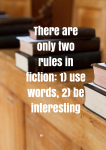



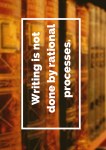
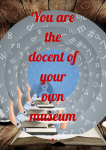

More on writing help:
Ten Commandments from Richard Bausch
Writer’s Tips #64: From Kurt Vonnegut
Jacqui Murray is the author of the popular Building a Midshipman , the story of her daughter’s journey from high school to United States Naval Academy. She is webmaster for six blogs, an Amazon Vine Voice book reviewer, a columnist for Examiner.com and TeachHUB, Editorial Review Board member for Journal for Computing Teachers, monthly contributor to Today’s Author and a freelance journalist on tech ed topics. In her free time, she writes technology training books for how to integrate tech in education. Currently, she’s editing a techno-thriller that should be out to publishers next summer.
Filed under: education, writers resources, writers tips Tagged: writing help


June 13, 2014
Book Review: Killer Angels
My rating: 5 of 5 stars
I’m not a Civil War buff, preferring my military history more current, but I read Killer Angels because my son (who is a history buff) recommended it. Since then, I’ve read everything Michael Shaara and his son Jeff (another historic fiction novelist) have written.
Killer Angels (Ballantine Books 1987) is about the Battle of Gettysburg, but from the human side (and why it’s consider fiction rather than fact). He touches on causes, but only as the soldiers would experience them. One Union soldier laments that if the South wins, he will no longer be able to visit the great fishing holes he enjoys in what would become a new and separate nation if the South wins.
The youthful soldiers on both sides, the battles they endure without enough food or supplies, the repercussions of a volunteer army–boys and men volunteered alongside others from their own state–makes for greater drama than any military retelling of this seminal battle. No one was conscripted. The fear many felt because they weren’t warriors, weren’t trained in battle, just common people drawn into the cause of their side. Killer Angels doesn’t replace the typical historic account of Gettysburg. It enhances it by adding a human layer, likely the most important in any battle. Even 150 years ago, the military taught its grunts to fight for the guy next to them in the foxhole, not some cause their government espoused.
In the end, my heart was saddened for the losers, for the death of their dreams and the loss of their innocence. I never did decide which side Shaara considered to be the Killer Angels.
More history reviews:
8 Tips for Creative Nonfiction Writers
8 Tips for Historic Fiction Writers
___________________________________________________________________________________
Jacqui Murray is the author of the popular Building a Midshipman , the story of her daughter’s journey from high school to United States Naval Academy. She is webmaster for six blogs, an Amazon Vine Voice book reviewer, a columnist for Examiner.com and TeachHUB, Editorial Review Board member for Journal for Computing Teachers, monthly contributor to Today’s Author and a freelance journalist on tech ed topics. In her free time, she writes technology training books for how to integrate tech in education. Currently, she’s editing a techno-thriller that should be out to publishers next summer.
Filed under: book reviews Tagged: creative nonfiction, history


June 11, 2014
12 Take-aways from WordCamp Orange County
 This past weekend I attended the fifth annual Orange County California two-day geek WordCamp. These are affordable tech-centric events held all over the country where WordPress experts share their knowledge in 50-minute sessions (or three-hour workshops) on how to better use your WordPress website or blog (that’s the connection to my writing–I have four blogs and one website that use WordPress). I was first introduced to it when TimeThief over at One Cool Site Blogging Tips posted on a WordCamp she attended in San Francisco. It sounded over my head–I’m not into coding and PHP and CSS–but she made it sound fun, like I wished I was into programming. That made me open-minded when a girlfriend suggested we attend.
This past weekend I attended the fifth annual Orange County California two-day geek WordCamp. These are affordable tech-centric events held all over the country where WordPress experts share their knowledge in 50-minute sessions (or three-hour workshops) on how to better use your WordPress website or blog (that’s the connection to my writing–I have four blogs and one website that use WordPress). I was first introduced to it when TimeThief over at One Cool Site Blogging Tips posted on a WordCamp she attended in San Francisco. It sounded over my head–I’m not into coding and PHP and CSS–but she made it sound fun, like I wished I was into programming. That made me open-minded when a girlfriend suggested we attend.
The $40 registration included all the events, lunch both days, snacks (see the pictures of the snacks below), designer coffee (or black-no-sugar like I like it), two T Shirts, a mug… Too much to list. A popular room was the Snack Spot which included everything you imagine coders and programmers and computer folk consume. (I took notes because I have a geek character in my current WIP). Snacks were non-stop, varied, abundant, with lots of water and coffee. Few sodas or diet drinks. Interesting…
 And it was a blast. Packed with geeks who had personalities. The attendees were open, funny, engaged and engaging, buzzing with energy like overcharged power plants. Everyone was there to learn and share–in equal measure. I was one of the least experienced (for example, one of the presenters started with the ‘easy stuff’ for five minutes–half of which was over my head).
And it was a blast. Packed with geeks who had personalities. The attendees were open, funny, engaged and engaging, buzzing with energy like overcharged power plants. Everyone was there to learn and share–in equal measure. I was one of the least experienced (for example, one of the presenters started with the ‘easy stuff’ for five minutes–half of which was over my head).
The presenters were eminently qualified. They knew their topics, fielded audience questions without a problem–and weren’t afraid to say they didn’t know but would find out, rarely ended early, never ran out of hints. One of the speakers was the guy who developed Amazon.com’s first website. That’s cred enough for me!
The most valuable thing I got, though, was the knowledge. The presenters were professional, varied in their voice and focus, approachable, on-topic, and more than half, I understood. Why not all? Back to that PHP and CSS stuff that I could learn (I know I could), but who has time?
Here are my top twelve take-aways from my two days with these folks:
make your blog about helping. Always be helpful, not to make money but to spread knowledge
because I’ve been blogging for five years, links in my early posts occasional die (the half-life of a link isn’t long). I stress over that, but who has time to go fix them pre-emptively? A presenter provided a great answer–refer the commenter to the date of the blog. Yeah, links have a lifespan.
if you wouldn’t say it at a cocktail party, don’t say it on your blog. Meaning: blogging isn’t baring your soul, sharing your emotions. It’s grown up since those days.
link back to lots of people who you’ve learned from. Be their cheerleader.
build trust by providing primary sources, educated opinions. Base your posts, articles, conclusions on evidence.
there are enough digital tools and hardware available that bloggers, developers, web consultants can be remote workers. You have to set up your virtual office, but it works well (see WanderingJon.com for more on that)
trouble-shooting and problem solving are great teachers
keep calm and Google on–letmegooglethatforyou.com. Funny. How many questions do you as a techie get that people could figure out themselves if they Googled it?
don’t give your Admin credentials to anyone
a 12-character password would take thousands of years to hack.
lots of people used Haiku Deck and Slideshare for presentations. I didn’t see any created in PowerPoint or Slides.
don’t post to FB through your blog. Do it manually so you get more traffic
More pictures? Check these out:

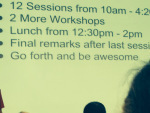
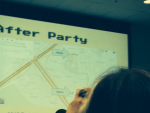
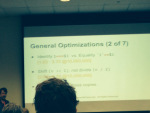

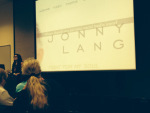

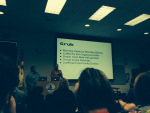



Anyone attended a WordCamp? What is your experience?
More on tech training:
6 Things I Wish I’d Known When I Started Blogging
Writers Tip #48: Have a Web Presence
Jacqui Murray is the author of the popular Building a Midshipman , the story of her daughter’s journey from high school to United States Naval Academy. She is webmaster for six blogs, an Amazon Vine Voice book reviewer, a columnist for Examiner.com and TeachHUB, Editorial Review Board member for Journal for Computing Teachers, monthly contributor to Today’s Author and a freelance journalist on tech ed topics. In her free time, she writes technology training books for how to integrate tech in education. Currently, she’s editing a techno-thriller that should be out to publishers next summer.
Filed under: bloggers resources Tagged: book marketing online, training


June 9, 2014
15 Traits Critical to a Successful Writer
At times, writing seems impossible. I wonder if I have what it takes or if there’s some critical piece I’m missing that means it just won’t ever happen. I do a lot of the right things-
I read, a lot
I’m observant
I’m a loner (or, the flip side–I don’t mind being alone)
I bloom where I’m planted
But is that enough? I went in search of other traits friends who I consider successful writers have that might inform me in my endless quest to succeed in a craft that few can. I found that more is required to become that person who can proudly, eruditely consider themselves a writer:
Writers have a selective memory–they forget the bad stuff people say and remember the good. Otherwise it’s depressing
Writers are conversant with their muse. Anywhere, at any time, on any subject. It doesn’t matter. When s/he starts talking, writers listen.
Writers are tethered to their voicemail in case that Big Call from an agent comes through. If there is no call, they check the machine to be sure it’s plugged in and working properly.
Writers understand the importance of taking a break an do something fun, like read a book. If they are one of those unlucky folk who get writer’s block, this will suffice.
Writers never show fear in front of their computer. It’s like a dog–it smells fear. It’ll then do nasty things like eat your manuscript or freeze in the middle of a scene.
Writers embrace the words of Winston Churchill: Success consists of going from failure to failure without loss of enthusiasm.
Writers can be categorized as plants or sharks. Plants take whatever life throws at them, hoping to survive long enough to publish. Sharks never stop moving, always hunting. Successful writers are sharks.
You can tell a lot about a writer by the way he/she handles three things: rejection, fame, and tangled Christmas tree lights.
Talking about a WIP is almost like writing it, but not as frightening
In golf, one of 14 clubs has to be the right decision. In writing, all 14 are wrong because readers want unique.
Don’t judge a writer by what he does between the lines.
Writers believe in the impossible, miracles, and Santa Claus. They will spend hours trying to literarily square the circle and consider it time well spent.
To rephrase Voltaire: No problem can stand the assault of sustained thinking from a thriller writer.
Where the engineer thinks of his equations as an approximation to reality, and the physicist thinks reality is an approximation to his equations, the writer thinks it doesn’t matter if the prose are elegant.
And #15: The most prevalent trait: We are dreamers, positive thinkers, and don’t know how to quit even if it would be in our best interests to move on. That above all else was part of the heart and soul of so many writers I admire.
How about you? What makes you a writer even if your job title says Accountant?
More about writers:
14 Things Writers Do Before 8am
Jacqui Murray is the author of the popular Building a Midshipman , the story of her daughter’s journey from high school to United States Naval Academy. She is webmaster for six blogs, an Amazon Vine Voice book reviewer, a columnist for Examiner.com and TeachHUB, Editorial Review Board member for Journal for Computing Teachers, monthly contributor to Today’s Author and a freelance journalist on tech ed topics. In her free time, she writes technology training books for how to integrate tech in education. Currently, she’s editing a techno-thriller that should be out to publishers next summer.
Filed under: humor, Todays Author, writers, writing Tagged: traits


June 6, 2014
Book Review: Decoded
by Mai Jia
My rating: 5 of 5 stars
I wasn’t sure whether I wanted to read Decoded by Mai Jia (Farrar Strauss & Giroux 2014) when it showed up on my Vine list, but a few details persuaded me to select it:
it is the story of an autistic math genius–Rong Jinzhen
it centers around cryptography–a fascinating subject to me
it promised to examine the mind of this inspired genius–making it character-based rather than plot-based
There were a few characteristics on the blurb that actually made me NOT want to read it:
betrayal–a friend of the math genius worked for an enemy of China in the same field as Rong Jinzhen
key to the human heart–I feared that would get in the way of the story parts I was intrigued by
I’m not into stories that delve into emotions and grand ideals from one unknown person’s perspective. Despite these, I selected the book and finished it in one day. It was wonderful.
Decoded is the story of intellectual issues that shaped the life of one man–Rong Jinzhen. It is written as though by a journalist investigating the rise and fall of a Chinese intellectual treasure named Rong Jinzhen. He is an autistic genius conscripted to serve his country’s most hidden intelligence unit as a cryptographer. We experience Rong Jinzhen’s life through the journalist’s notes and eyes. There are significant biographical elements, but an equal amount of analysis of cerebral topics like math, cryptanalysis, what makes a genius–as though the article will eventually be published in an intelligence journal. Along the way, the reader gets a deep understanding of life in Communist China through the lives of Rong Jinzhen and his family and co-workers. The story is quite narrative, exactly as notes might read before melded into a printable story. It is so well done, I am not convinced Rong Jinzhen is not a real person.
What struck me also was the effort the author made to share Rong Jinzhen’s joy of learning. He not only is a genius, but revels in the amazing ability he has to connect dots, find patterns, and problem solve. This is his adopted father explaining the topic of leap years to his new son in a way that shows respect for Rong Jinzhen’s atypical approach to learning:
“When I said that you were wrong just now, I was speaking theoretically–the fact is that you ignored the existence of leap years. On the other hand, if you look at it from the point of view of mathematics, it would be impossible to say that you were wrong because there are acceptable errors in any calculation.”
“According to my knowledge, the time it takes the earth to complete one orbit of the sun is 365 days, 5 hours, 48 minutes and 46 seconds. So why do we need leap years? There is a simple reason [which the father explains for 200 more words]
Readers of this book are treated to a joyous smorgasbord of cerebral sustenance. If you aren’t an admirer of the human brain, you might not appreciate this book as much as I did. As the author says:
“I say not working is most exhausting because your mind is empty. It is very much like dreaming; the past can take advantage of your weakness and burst in. Work is the means by which the past can be forgotten, and even the reason for it to be cast off.”
One feature I particularly liked: The author, when discussing any country other than China, uses letters or fake names. This keeps politics and geopolitical discussions at arms-length.
This is the second book I’ve read by a Chinese national (the first was Gao Jianqun’s Tongwan City)–I thoroughly enjoyed both. It is highly recommended for those who enjoy lots of creative thinking and problem solving in their plots.
More intellectual stories:
A Short History of Nearly Everything
Einstein: His Life and Universe
Jacqui Murray is the author of the popular Building a Midshipman , the story of her daughter’s journey from high school to United States Naval Academy. She is webmaster for six blogs, an Amazon Vine Voice book reviewer, a columnist for Examiner.com and TeachHUB, Editorial Review Board member for Journal for Computing Teachers, monthly contributor to Today’s Author and a freelance journalist on tech ed topics. In her free time, she is editor of technology training books for how to integrate technology in education. Currently, she’s editing a techno-thriller that should be out to publishers next summer.
Filed under: book reviews Tagged: problem-solving


June 5, 2014
What’s Trending on WordDreams
 In the past quarter, I’ve posted about 40 articles on topics ranging from writer resources, how-to’s, descriptors, and opinions. I like to step back a few times a year and determine what readers are most interested in. WordPress makes that easy with their statistics.
In the past quarter, I’ve posted about 40 articles on topics ranging from writer resources, how-to’s, descriptors, and opinions. I like to step back a few times a year and determine what readers are most interested in. WordPress makes that easy with their statistics.
Here’s this period’s run-down:
51 Great Similes to Spark Imagination
178 Ways to Describe Women’s Clothing
35 Weird Traits Your Characters May Have
How to Describe a Landscape
How to Describe Nature
How to Describe a Person’s Clothing
Word Count by Genre
Characteristics That Make Your Character Memorable
Plotting a Story–with a Spreadsheet
103 Most Beautiful Words? You Decide
Interesting, isn’t it? 9 out of 10 are descriptions. That tells me, writers visit my blog to hone skills, not for my opinions (which is good because I’m not terribly opinionated, and those I have, I’m happy to keep between my husband and myself and my critique group).
What do you think?
Jacqui Murray is the author of the popular Building a Midshipman , the story of her daughter’s journey from high school to United States Naval Academy. She is webmaster for six blogs, an Amazon Vine Voice book reviewer, a columnist for Examiner.com and TeachHUB, Editorial Review Board member for Journal for Computing Teachers, monthly contributor to Today’s Author and a freelance journalist on tech ed topics. In her free time, she is editor of technology training books for how to integrate technology in education. Currently, she’s editing a techno-thriller that should be out to publishers next summer.
Filed under: descriptors, writers resources Tagged: descriptions, writing resources





